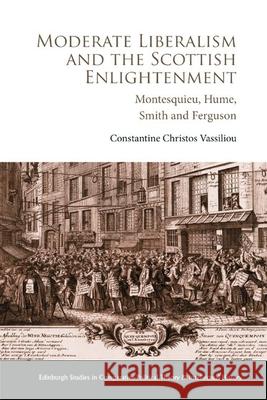Moderate Liberalism and the Scottish Enlightenment: Montesquieu, Hume, Smith and Ferguson » książka
Moderate Liberalism and the Scottish Enlightenment: Montesquieu, Hume, Smith and Ferguson
ISBN-13: 9781399521192 / Angielski
Moderate Liberalism and the Scottish Enlightenment: Montesquieu, Hume, Smith and Ferguson
ISBN-13: 9781399521192 / Angielski
(netto: 439,20 VAT: 5%)
Najniższa cena z 30 dni: 421,40
ok. 30 dni roboczych.
Darmowa dostawa!
Examines how Montesquieu, Hume, Smith, and Ferguson's foundational liberal theories responded to the moral and civic challenges of early capitalism Brings together discussions of key Enlightenment thinkers Montesquieu, David Hume, Adam Smith, and Adam Ferguson Recaptures a conceptual space in the famous eighteenth-century commerce and virtue debates, which illustrates the possibility that one may accept the general principles of modernity while maintaining a healthy skepticism towards commerce Compares how Montesquieu and key thinkers of the Scottish Enlightenment developed their distinct theories of honour in the context of eighteenth-century high finance, namely, in response to the infamous collapse of the Mississippi and South Sea 'bubbles' (1720) Provides a heuristic device for identifying when commercial innovation poses a threat to liberal societies, and a framework for balancing commercial ends with the public good under conditions of liberal democracy Expands the currency of ideas available in foundational liberal thought for identifying an emotional quality that is necessary for twentyfirst-century citizenship Montesquieu's Moderate Liberalism and the Scottish Enlightenment responds to a perennial problem in political theory: how to balance commercial considerations with the public good. It investigates this dilemma through the lenses of Enlightenment thinkers whose liberal theories responded to the hazards of commercial innovation during capitalism's nascent stages. Vassiliou argues that Montesquieu, David Hume, Adam Smith, and Adam Ferguson represent a moderate perspective in foundational liberal thought, which emphasizes the critical importance of honour. He compares how their liberal theories uniquely channel human beings' desire for honour to nourish a sense of interpersonal magnanimity within an inward-looking, liberal commercial world. In an age of polarized extremes, we have witnessed restive democracies flirting with populist, illiberal responses for managing the hazards of capitalist innovation. Montesquieu and his Scottish counterparts' foundational liberal theories offer us more viable, middle-ground prescriptions which are sensitive to the emotional constitution of a liberal society.











